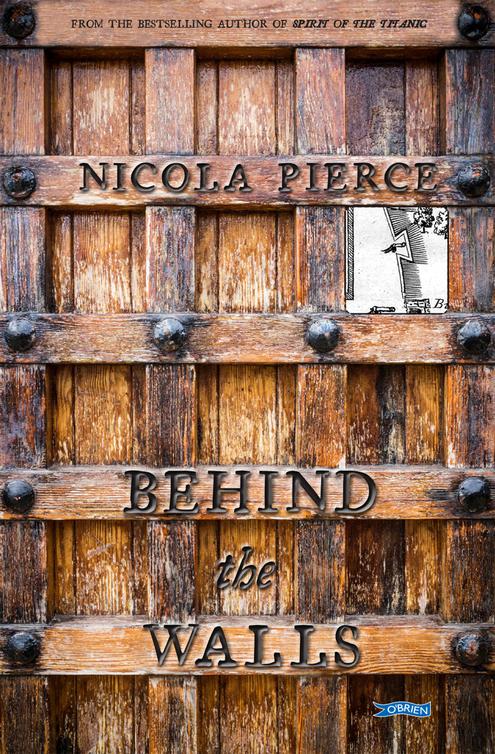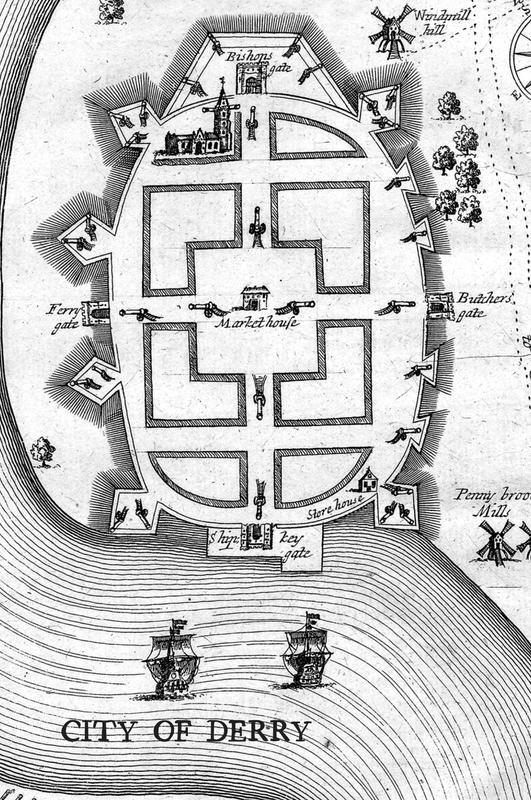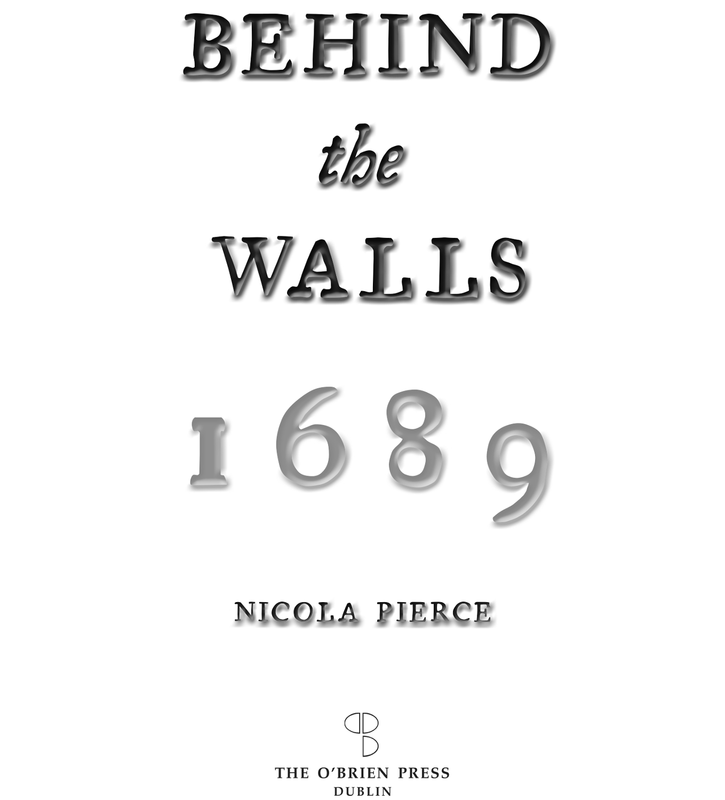Behind the Walls
Authors: Nicola Pierce



Reviews of
Spirit of the Titanic
‘Gripping, exciting and unimaginably shattering’
Guardian Children’s Books
‘Captivating’
Sunday Business Post
‘Intriguing’
Belfast Telegraph
‘I absolutely adored this book. It makes you feel like you were there’
Finty, reader review
Reviews of
City of Fate
‘Compelling novel, combining rich characterisation with a powerfully evoked sense of time and place’
Robert Dunbar,
The Irish Times
‘Utterly brilliant with believable characters and a fantastic story line, this is historical fiction at its best’
‘Excellent … vivid and moving’

For my parents
- Reviews
- Title Page
- Dedication
- Acknowledgements
- Prologue
-
- Chapter One
- Chapter Two
- Chapter Three
- Chapter Four
- Chapter Five
- Chapter Six
- Chapter Seven
- Chapter Eight
- Chapter Nine
- Chapter Ten
- Chapter Eleven
- Chapter Twelve
- Chapter Thirteen
- Chapter Fourteen
- Chapter Fifteen
- Chapter Sixteen
- Chapter Seventeen
- Chapter Eighteen
- Chapter Nineteen
- Chapter Twenty
- Chapter Twenty-One
- Chapter Twenty-Two
- Chapter Twenty-Three
- Chapter Twenty-Four
- Chapter Twenty-Five
- Chapter Twenty-Six
- Chapter Twenty-Seven
- Chapter Twenty-Eight
- Chapter Twenty-Nine
-
- Glossary
- Writer’s Notes
- Biographies
- Bibliography
- About the Author
- Copyright
Firstly, can I start by encouraging readers to visit the wonderful city of Derry. Her walls are still intact and I especially recommend the walking tours and do not forget St Columb’s Cathedral. This compact building provided the city’s starving population with comfort and shelter. Go inside and take a right into a humble room that contains Adam Murray’s sword, pocket watch and snuff box. They are there for all to see, including an original copy of George Walker’s book of the siege.
Secondly, I wish to thank Peter Heaney for being my tour guide on my visit to his city. Apart from taking an entire day to lead me around, and find me every available pamphlet on the siege, he asked the cathedral’s caretakers if I could hold Adam’s possessions in my trembling hand. I didn’t even think to have a photograph taken as I was too enthralled by the sword and watch; it simply never occurred to me.
Peter was also one of the manuscript’s earliest readers and I wish to thank him for his sound advice and suggestions.
Other readers include Robert Dunbar, Niall Carney, Damian Keenan and Jack Maguire, and all opinions and suggestions were greatly appreciated.
This is my third novel and it was the hardest one to write yet. I’m not sure if this is a good or a bad thing, but there you have it.
Susan Houlden, my editor, pushed me to expand and explain, and expand and explain some more. This would not be the book it is today if it weren’t for her tireless efforts and passion. Any mistakes are entirely my fault!
Emma Byrne’s gorgeous art gave me the boost that I needed on a grey, wet afternoon when I felt I would never finish it. If for no other reason I had to keep going because her cover deserved a story.
And, finally, I want to acknowledge everyone who played a part in my writer’s life in the last few years: to the librarians, teachers, booksellers and children who read my books or come to hear me talk about them … thank you!

I
t is the winter of 1688 and bloody conflict rages across Europe. King Louis XIV, the Catholic king of France, wants to rule over the entire continent but cannot defeat his most hated enemy, the Dutch Protestant Prince William of Orange. Meanwhile, the mostly Protestant population of England bristle beneath the reign of the Catholic King James. Telling themselves not to worry, they reason that he is an old man, without an heir, and will be gone soon enough. On his death, his Protestant daughter Princess Mary, who is married to the Dutch William, will take her father’s crown and all will be well again.
However, the heir to the throne changes when James and his much younger Catholic wife have a son, a male heir who will bow to the Pope in Rome. This proves too much for the English Parliament. They invite the fiery Prince of Orange to ‘invade’ and thus challenge James for the throne. William, anxious to rid France of another Catholic ally, accepts the invitation.
James flees to France, to be welcomed with open arms by his cousin, King Louis. There, they scheme to win back his English crown and decide to aim for a foothold in neighbouring Ireland.
It is a good plan except for the fact that not everybody on the island is Catholic or a devotee of King James. Take, for instance, the small walled city up north, founded by a saint and home to proud descendants of Protestant English and Scottish families, and the king’s army. Who would have believed that the city of Derry was about to take centre stage for the first of three battles in the war of three kings, James, William and Louis XIV – a war which would change Europe forever.
A
full-blown row had broken out, ruining what had otherwise been a peaceful afternoon, in this part of Derry at least. Horace had strayed again, breaking the rules and showing utter disregard for his surroundings, only these streets weren’t
his
actual surroundings, which was the problem. He stood his ground, trying to make himself appear larger and taller than the others. A mischievous twinkle in his eye was the only proof that he knew exactly what he was doing and was more than ready for the circumstances.
In fact he was bigger than his opponents. The difficulty lay in the fact that there was only him while his opponents were a proper gang with a designated leader, followers and some sort of unspoken pact that they would not tolerate strangers on their street.
In baring his teeth, Horace declared his challenge while refusing to retreat. The high-pitched barking and snarling was fierce. There was no mistaking the sound of rage but the casual onlookers were unimpressed. Eyes rolled and heads were shaken at the clamouring uproar. A young girl
who was scrubbing hard at a front door with a brushful of sudsy water let out a snarl of her own, ‘Oh shut up, the lot of ye!’ Horace blinked at her, his expression suggesting that he had no idea what the fuss was all about. However the girl ignored Horace’s attempt at innocence and pointed rudely at him, ‘You’re the cause of all this trouble. Go back to wherever you came from or, by God, I’ll give you a swift kick up the …’
‘Horace!’ Daniel Sherrard had finally caught up with his rebel of a dog. Smiling nervously at the girl, Daniel beckoned his friend to his side. ‘Come over here, Horace. Good boy!’
Horace hesitated; after all, a fight was a fight.
But the others decided that it was no longer worth the hassle; there were too many around now. So they made do with a few threats and curses, wanting to suggest to the invader that he had narrowly escaped the most ferocious violence. Really, it would be best for everyone if he could just have stayed out of their area, back where he belonged in the Protestant quarters.
Daniel called him again. ‘Horace!’ This time the large dog licked his lips, sneezed and turned to nuzzle his owner’s shins. Daniel patted him on the head.
The girl also quietened down though she felt obliged to offer some haughty advice. ‘Maybe you shouldn’t walk him around here.’ She stopped scrubbing to check that the
hem of her apron had not dipped into the bucket of water beside her feet.
Daniel shook his head. ‘I don’t! He runs off on me.’
Horace scratched himself a little and then found it necessary to plop down so that he could scratch himself a lot harder. Daniel watched him and offered the girl an embarrassed shrug. She almost smiled at him but was mindful of her father inside the house who would not be pleased with her talking to a boy, particularly a strange one. She knew all the boys in her tight-knit community which meant that the ‘foreigner’ had to be a Protestant. He certainly looked unsure of himself. He was far from home.
The other dogs had removed themselves to the far end of the street where they seemed to be having a good sulk together. Gesturing at them, the girl said, ‘Best you be getting him home before they decide to make another run at him … and you.’
Both dog and boy were strangers here.
Daniel experienced a tremor of annoyance. This was his city and he was allowed to go wherever he liked. Nevertheless there was no denying it. He didn’t choose to come to this street. He was only here because of his disobedient pet. Tapping his leg, he said, ‘Come on, boy. Let’s go.’ Horace gave the dogs a last cheeky bark and bounded ahead of Daniel.
As they neared the Diamond, the centre of the city,
the streets got busier and dirtier. Daniel stepped over the stinking piles left behind by horses and cattle, his mother’s warning against dirtying his new boots ringing in his ears. He took hold of Horace by the scruff of his neck in case the dog took off after the livestock.
There seemed to be a gathering in front of the Markethouse which usually meant that there was some sort of news pinned up on the wall of the building. Daniel could barely hear whatever was being read aloud over the clucking of the hens and the bleating of the skittish lambs. Carts rolled noisily over the paved stones, competing against the clip-clopping of the horses. Everywhere Daniel looked someone was either busy buying or selling something: candles, milk, animals, fish, eggs and shoes. Whatever a person fancied could be got here.
A beggar caught his eye. There were plenty of them. This one looked to be his father’s age. His clothes were filthy and torn, just like his face. Daniel quickly looked away from him, judging the man to be a drunk, and one who was apt to get himself beaten up regularly.
Derry was a garrison city, meaning that she provided bread and board for the army of the king of England. However, two weeks earlier the city’s soldiers and their commander, Lord Mountjoy, had left for Dublin, answering the summons of Sir Richard Talbot, the new lord lieutenant of Ireland. The ambitious Talbot was a loyal friend to
the Catholic King James, and revelled in his prestigious appointment. Almost the first thing he did was to insist on a meeting with Derry’s army of Protestants. Daniel found it peculiar not to see the uniform of the battalion standing out from amongst the crowd.
The previous evening his parents had discussed the turn of events, anxiously wondering what it could all mean. ‘Soldiers keep the peace,’ his mother had said; to which his father had muttered, ‘It depends on the soldier.’
Robert, Daniel’s older brother, immediately asked, ‘What do you mean, Father?’ He had his mother’s dark eyes and high cheek bones while Daniel shared his father’s features, clear blue eyes and a softness about the cheeks and chin.
Mr Sherrard sighed, ‘Lord Mountjoy’s regiment are mostly Protestant.’
Robert thought for a moment. ‘You mean you think they will send us a Catholic regiment instead of allowing Mountjoy’s men to return?’
His father nodded. ‘Oh, I think that is a strong possibility, don’t you? This city, along with Enniskillen, is one of the last Protestant strongholds, and I suspect that the Catholic lord lieutenant would much prefer us to be policed by his own.’
Daniel was suddenly returned to his surroundings by the sound of a commotion nearby. ‘Thief! Thief!’ A woman
screamed and pretended to break into a run, but whoever it was that snatched her purse was already gone, disappearing into the throng of people who were drifting towards the Markethouse. Daniel shrugged his disapproval. It was the second robbery he had witnessed today.
The city needs her soldiers
. That was his opinion. Even he could not help feeling the growing tension on the streets as the rumours raced throughout about marauding, murderous armies representing the Catholic king of England, James II.
A Catholic on the throne of England? How could this be?
Ordinarily Daniel did not concern himself with such worldly affairs but he simply could not ignore the worry in his parents’ eyes. It felt sensible to accept that there might be trouble ahead, though how he could not yet imagine.
I wish I was clever like Robert.
If his brother had been present, Robert would have playfully punched Daniel in the arm, reminding him that there were three long years between them – nearly a thousand days. It was a huge difference between any fourteen- and seventeen-year-old boy.
Well, that’s just it
, he thought.
Robert is no longer a boy, he is almost a man.
Horace yawned. Daniel glanced down at him. ‘Sorry, boy, but I want to hear what’s going on and then we’ll go straight home. I promise!’ Daniel believed that his dog understood every word he said. Since Horace made no
move to voice his disagreement, Daniel was free to pat him as thanks for his cooperation. They joined the surging crowd. Daniel was putting his new plan into action, to keep himself informed of whatever was happening in his city and beyond.
After all
, he reasoned to himself,
I’m no longer a child either.
A man called out, ‘Please repeat yourself, sir. We didn’t hear you!’
Several people around Daniel cried out, ‘Speak up! Speak up!’ The new additions to the crowd seemed anxious about what they might be missing. As far as Daniel was concerned their nervousness was thanks to the rumours of Catholic, or Papist, invaders.
The speaker, one of the townsmen, held up his hand and shouted as politely as he could, ‘Alright, alright. Quieten down.’ He waited for silence. ‘This here,’ he began, pointing to the pamphlet in his hand, ‘was issued by Prince William of Orange.’ Some clapping dutifully greeted the prince’s name. People craned their necks to be sure to catch every word uttered. In fact the speaker was gearing himself up for his big moment and thus roared his next line, ‘The Dutch Prince has declared the infant Prince of Wales to be an imposter!’
Well!
The word ‘imposter’ was taken up and repeated several times over, first in hushed tones but then as more people
joined in it became louder and angrier: ‘“Imposter”? “Imposter”? Yes! “IMPOSTER”!’
A chorus of ‘Hear! Hear!’ rang out from the ones who had already heard the news. They’d had time to digest the information and agree that the newborn son of Catholic King James had no right to, what must only ever be, the Protestant throne of England. Anxious to hear the rest of the pamphlet they began shushing in earnest. There was no time to waste just yet.
‘Let me continue!’ called the speaker. ‘Prince William says he doesn’t wish to seize the throne for himself but he does believe that his father-in-law, King James, is being ill advised by the worst sort of people.’
Daniel assumed that both William and the speaker meant Catholics when they referred to the ‘worst sort of people’. King James had surrounded himself with Catholic friends and servants, losing the love of his two Protestant daughters Mary and Ann and a lot else besides.
Two elderly women beside Daniel accepted this, one of them declaring, ‘Well, William is not going to bring violence against his own father-in-law, is he?’
Her friend nodded and then thought of something. ‘And he’s a foreigner. So, he can’t very well go and make war on the English throne, now can he?’
The first one sniffed her agreement. ‘You’re right, Doris. Sure the English wouldn’t stand for that!’
Daniel wished they’d both shut up. The man was now reading out a list of things – bad things – that had been done in James’s name, but Daniel couldn’t hear a blessed word.
Horace whimpered his impatience to leave which, unfortunately for Daniel, set the women off on another topic.
‘That dog smells!’ pronounced the one called Doris.
Her friend giggled, ‘Almost as bad as your Harold!’
The two women burst out laughing, annoying the ones behind them. Daniel was grateful when the others shushed them. There was no way he would have done it himself; they would have boxed his ears.
There was silence just in time to hear the man finish off by saying, ‘William suggests a free parliament, one that can fix all the wrongdoing.’
There was a sober applause to this and then, when there seemed to be nothing else to read or hear, the crowd slowly, almost reluctantly, began to disperse.
Horace licked Daniel’s hand as if to remind him of his promise that they would go now. Daniel paused to be absolutely sure that the meeting was at an end, before allowing himself to be pulled along in the direction of home.

